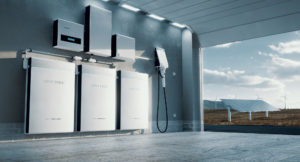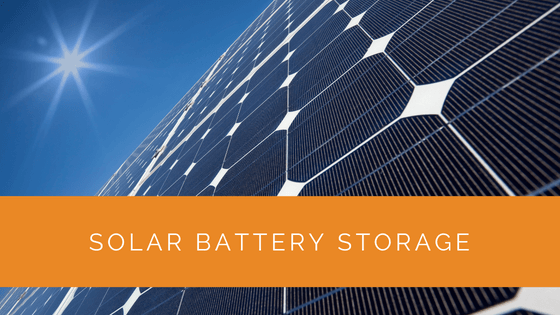Harnessing solar energy efficiently and effectively is critical in our journey towards sustainable living. This article delves into the heart of solar battery storage, a key component in maximizing the benefits of solar power. Understanding the different types of solar batteries available, their lifespans, storage requirements, and overall performance is vital for anyone considering solar power for their home. With a focus on practicality and informed decision-making, this piece offers insights into the diverse world of solar batteries, guiding you through the nuances of each type and helping you determine the best fit for your energy needs. Whether you’re a seasoned solar user or new to the concept, this article is your comprehensive guide to navigating the complexities of solar battery storage for optimal energy efficiency and sustainability.
Contents
- 1 Key Takeaways
- 2 Solar Battery Types
- 3 Where should solar batteries be stored?
- 4 How long will a 10kw battery last?
- 5 How many solar batteries are needed to power a house?
- 6 How do I choose a solar battery?
- 7 Which solar batteries last longest?
- 8 Are lead-acid batteries bad for you?
- 9 Are Lithium-ion batteries any good?
- 10 How long does a solar home battery last?
- 11 Case Study: Solar Battery Storage Installation
- 12 Expert Insights From Our Solar Panel Installers About Solar Battery Storage
- 13 Experience Solar Excellence with Us!
- 14 Wrapping it up
Key Takeaways
- Solar batteries come in various types, including lead-acid, lithium iron phosphate, lithium-ion nickel manganese cobalt oxide, and flow batteries. Each type has advantages and disadvantages regarding lifespan, cost, and efficiency.
- To maximize the efficiency and lifespan of your solar batteries, storing them in a location with proper insulation, thermal mass, and protection from direct sunlight is crucial. Different types of batteries may have specific storage requirements.
- The lifespan of solar batteries can vary widely, from 3 to over 10 years, depending on the type. When choosing a solar battery, consider factors such as peak output, cycling capabilities, and cost-effectiveness to determine the best option for your solar energy system.
Solar Battery Types
Before you invest in a solar power system for your home, you should know about the different types of batteries available on the market. Most solar batteries have excellent backup power. However, to make things easier for you, here’s a list of all the different types of batteries used in a solar power system.
Lead-acid batteries
This is one of the most tested solar energy storage technology. Moreover, sealed lead-acid batteries have seen their evolution from off-grid solar installation systems. They do not have a deep cycle battery and a short life span.
However, unlike most home solar batteries, these are very cheap and affordable. You will find this type of battery system in your car, your boat, or even your golf cart. The battery’s capacity and lifespan are around 3 to 5 years, making it one of the best solar batteries out there.
Lithium iron phosphate batteries
If you want a better battery life than the lead-acid batteries on the market, this solar battery is the next best thing for you. The downside of most lithium-ion batteries is that they heat up fast. However, the best thing about iron phosphate is that it remains cool and doesn’t do that.
Hence, you will see that the solar system will not suffer from high levels of heat damage. This makes LiFePO4 the best solar battery out there to prevent thermal runaway. The battery capacity and the battery lifespan are more than 10 years!
Can you imagine how much electricity you will be saving? This makes lithium iron phosphate one of the most excellent solar battery options. However, you should keep in mind its high cost, unlike other batteries on the energy storage market.

Lithium-ion nickel manganese cobalt oxide batteries
If you want to have an excellent usable capacity for daily use and good battery power overall, this is the battery for you! The depth of discharge for this battery is more as it has a higher density. This makes it less stable in nature.
The best feature of this battery storage system is that it is very lightweight. However, the battery cycle of Lithium-ion NMC batteries is very short. Since it does not have deep cycle batteries, it is used in cell phones and electric vehicles.
These batteries will last you over 10 years, making them one of the best solar battery storage systems out there.
Flow batteries
Do you want to find a battery with a high power-rating and a long cycle life? Well, this solar battery bank is meant for you! This type of solar battery system offers 100 per cent of the DoD. Hence, you can use these batteries heavily and still have round-trip efficiency.
The one downside can be the cost of these batteries. If you buy multiple batteries, it will probably leave a massive hole in your pocket! You might be wondering, why is that so? Well, these batteries use vanadium, which is a super expensive metal.
Hence, the cost of these batteries also increases then. You can ensure there won’t be a low power rating; that’s for sure, though! Flow batteries’ battery capacity and life cycle are around 5 to 10 years.
Do you think this is the right solar battery for you?
Where should solar batteries be stored?
The first thing you need to know about solar batteries is where you can store them for total round-trip efficiency. In addition to this, you will also want to see where you can store excess energy from your solar panel battery system.
The best place for you to keep your lithium-ion batteries or even other forms of solar batteries is in a place that has total insulation. Ensure that there is enough thermal mass and complete protection from the sun’s rays.
If you want a good and continuous power rating, you should ensure that your solar battery is well protected. You can keep all your low-maintenance batteries, like AGM batteries, in your home itself. However, some solar batteries will need to be well kept in a shed or garage.
How long will a 10kw battery last?
If you’re interested in knowing exactly how long will a 10 kilowatt-hours (kWh) battery last, then you have come to the right place. A 10kw battery will last you 10 to 12 hours on average to keep it short and straightforward.
You can note that a 13.5kw battery will last you anywhere from 13 to 16 hours on average for comparison purposes. Battery types also play a role in the depth of discharge and round trip efficiency of the entire solar installation.
How many solar batteries are needed to power a house?
Solar panels produce a ton of energy every single day. So, the first question that might be on your mind is, how many batteries do you need to power your entire home? How much power and how much energy can your solar system produce?
On average, a home in the USA will require around 19 to 23 solar panels to power the entire house. The electricity produced would be about 877 kWh in a month. The average cost will be from $13,000 to $16,200 if you opt for this system.
How do I choose a solar battery?
If you want your solar battery to give you maximum power, you should definitely look at its peak output. Let’s break it down. Peak output will tell you the measure of comparison of the energy provided by your solar batteries work.
In easy terms, the higher the kWp rating, the more power output there will be. Hence, the better the performance of the solar battery will be as it will have more depth of discharge. Therefore, make sure to invest in a battery with a very high peak output.
Which solar batteries last longest?
Of course, you would want to know which battery will run the longest in your home. This way, you will be able to have more cost per use of your purchase, and who doesn’t want that? On average, you will find 3 different types of batteries in everyday use:
- Lithium-ion battery
- Lead-acid battery
- Saltwater battery
You will find that the first lithium battery will last you the longest from those mentioned above. Not only that, but these batteries will also have the best storage capacity on the market. However, the cost can be a bit too much to handle, so you need to keep that in mind for sure.

Are lead-acid batteries bad for you?
Lead has had a frisky past with humans. It has been used in various places, including makeup, which actually caused poisoning and death! That’s 100 percent something you do not want happening again!
Hence, to clear the air here is the real deal about lead-acid batteries. They can be harmful, but only if they are not correctly disposed of. When they are just thrown away with no care, the environment is harmed terribly.
Do you know what that leads to? Human health degradation. The reason for this is that these batteries use sulfuric acid and lead in their production. These are highly contaminating materials and leech into solid as well as groundwater to pose significant threats to human health.
Are Lithium-ion batteries any good?
If you want to know the best batteries for your solar panel system, you should know about the advantages of a lithium-ion battery. The best part about these batteries is their cycling capabilities.
Compared to lead-acid batteries, a lithium battery will produce more cycles overall. Hence, if you want to optimize your solar energy system, these are great options. This is not even the most of it!
These batteries also provide ancillary services. This means that the solar batteries store enough energy to flatten the curve of energy demand. Your solar systems will be able to store the power that is generated during light time.
All the excess energy and excess electricity come into use during nighttime, making these batteries an excellent tool for flattening the energy demand curve!
How long does a solar home battery last?
You might also be curious about how long your solar panels home battery will last. Well, firstly, you can always increase the lifespan of your batteries by taking proper care of them. You can take care of the following things to ensure that your batteries last a long time:
- Ensuring the proper temperatures for storage
- Not discharging it beyond the depth of discharge limit
- Have the correct charge level when it is not being used
You can probably expect your home solar battery to last anywhere from 5 to 15 years in total to answer the question.
Case Study: Solar Battery Storage Installation
Background
The Rodriguez family, residing in Tampa, Florida, decided to enhance their home’s energy efficiency by integrating solar battery storage into their existing solar power system. With frequent sunny days and a growing emphasis on sustainability, Tampa provided an ideal setting for this investment. The family turned to Solar Panels Network USA for guidance on the best battery options and installation practices.
Project Planning and Objectives
The Rodriguez family’s primary goals were to ensure a reliable energy supply during power outages, reduce their reliance on the grid, and optimize their solar energy usage. They needed a solution that offered a long battery life, high efficiency, and safety.
Installation and Costs
After a thorough assessment, a lithium iron phosphate (LiFePO4) battery was recommended due to its durability and excellent performance. The total cost breakdown included:
- Solar Battery: $8,000
- Installation: $2,500
- Permits and Inspections: $500
- Total Estimated Cost: $11,000
Financial Incentives:
- Federal Tax Credit (ITC): $3,300
- State Rebates: $1,000
- Adjusted Total Cost: $6,700
Installation Process
The installation process was completed in two days, involving the following steps:
- Site Preparation: Identifying an optimal location in the garage with proper insulation and ventilation.
- Battery Installation: Mounting the LiFePO4 battery and connecting it to the existing solar power system.
- System Integration: Ensuring seamless integration with the home’s electrical system to allow automatic switching during outages.
- Inspection and Activation: Conducting a final inspection and activating the system for use.
Results and Benefits
The Rodriguez family’s solar battery system provided them with a reliable backup power source, significantly reducing their dependence on the grid. The system’s ability to store excess solar energy for use during the night and on cloudy days optimizes its overall energy consumption.
Environmental and Financial Impact:
- Annual Savings: $1,200
- Payback Period: ~5.5 years
- Reduced CO2 Emissions: ~2.5 metric tons annually
- Enhanced Energy Independence: The family experienced fewer disruptions during power outages.
Summary
The Rodriguez family’s experience highlights the significant benefits of incorporating solar battery storage into a residential solar power system. By choosing a high-quality lithium iron phosphate battery and leveraging state and federal incentives, they achieved a cost-effective and sustainable energy solution. Solar Panels Network USA’s expertise ensured a smooth installation process, demonstrating the importance of professional guidance in optimizing solar energy systems. Tampa’s sunny climate and supportive policies make it an ideal location for solar energy adoption, setting a positive example for other homeowners considering similar investments.
Expert Insights From Our Solar Panel Installers About Solar Battery Storage
Choosing the right solar battery can dramatically impact the efficiency and longevity of your solar energy system. Lithium iron phosphate batteries, for instance, offer exceptional lifespan and safety, making them a popular choice among homeowners looking for reliable energy storage solutions.
Proper storage of solar batteries is crucial to maintaining their performance and lifespan. Ensuring they are kept in a location with adequate insulation and protection from direct sunlight can prevent thermal damage and optimize their efficiency.
Understanding the specific needs of your household’s energy consumption can help you select the most cost-effective and efficient solar battery. Factors like peak output, cycling capabilities, and overall cost should all be considered to maximize the benefits of your solar power system.
Experience Solar Excellence with Us!
Trust in Solar Panels Network USA, where our seasoned experts deliver top-quality solar solutions for homes and businesses nationwide. With a legacy of countless successful installations and a commitment to sustainable energy, we’re your reliable partner in the solar journey. Ready for a brighter, eco-friendly future? Call us now at (855) 427-0058 and harness the power of the sun!
Wrapping it up
It is true that the sun won’t always be shining in your favor when it comes to solar energy-powered homes. Hence, it becomes essential to learn how to store your batteries properly.
There are various batteries you can choose from for solar panels energy storage. So, go out there and select the perfect battery for you and your home. Don’t forget to store it properly, or else you just might have a burning hole in your pocket!
About the Author
Solar Panels Network USA stands at the forefront of solar energy solutions, driven by a team of seasoned solar engineers and energy consultants. With over decades of experience in delivering high-quality solar installations and maintenance, we are committed to promoting sustainable energy through customer-centric, tailored solutions. Our articles reflect this commitment, crafted collaboratively by experts to provide accurate, up-to-date insights into solar technology, ensuring our readers are well-informed and empowered in their solar energy decisions.

